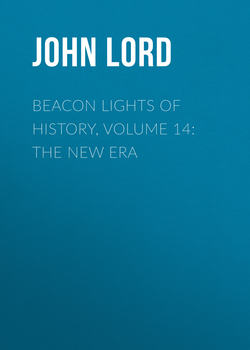Beacon Lights of History, Volume 14: The New Era

Реклама. ООО «ЛитРес», ИНН: 7719571260.
Оглавление
John Lord. Beacon Lights of History, Volume 14: The New Era
PUBLISHERS' PREFACE
RICHARD WAGNER: MODERN MUSIC
AUTHORITIES
JOHN RUSKIN
AUTHORITIES
HERBERT SPENCER
I
II
III
IV
V
VI
AUTHORITIES
CHARLES ROBERT DARWIN
I
II
III
IV
V
VI
AUTHORITIES
JOHN ERICSSON
AUTHORITIES
LI HUNG CHANG
INTRODUCTORY
I. INTERCOURSE WITH CHINA BY LAND
II. INTERCOURSE BY SEA
III. THE OPIUM WAR
IV. THE TAIPING REBELLION
V. THE "ARROW" WAR; THE TREATIES
VI. THE WAR WITH FRANCE
VII. WAR WITH JAPAN
VIII. WAR WITH THE WORLD
DAVID LIVINGSTONE
AUTHORITIES
SIR AUSTEN HENRY LAYARD
AUTHORITIES
MICHAEL FARADAY
AUTHORITIES
RUDOLF VIRCHOW
AUTHORITIES
Отрывок из книги
If the Dresden schoolboys who attended the Kreuzschule in the years 1823-1827 could have been told that one of them was destined to be the greatest opera composer of all times, and to influence the musicians of all countries throughout the second half of the nineteenth century, they would, no doubt, have been very much surprised. Nor is it likely that they could have guessed which of them was the chosen one. For Richard Wagner–or Richard Geyer, as he was then called, after his stepfather–was by no means a youthful prodigy, like Mozart or Liszt. It is related that Beethoven shed tears of displeasure over his first music lessons; nevertheless, it was obvious from the beginning that he had a special gift for music. Richard Wagner, on the other hand, apparently had none. When he was eight years old his stepfather, shortly before his death, heard him play on the piano two pieces from one of Weber's operas, which made him wonder if Richard might "perhaps" have talent for music. His piano teacher did not believe even in that "perhaps," but told him bluntly he would "never amount to anything" as a musician.
For poetry, however, young Richard had a decided inclination in his school years; and this was significant, inasmuch as it afterwards became his cardinal maxim that in an opera "the play's the thing," and the music merely a means of intensifying the emotional expression. Before his time the music, or rather the singing of florid tunes, had been "the thing," and the libretto merely a peg to hang these tunes on. In this respect, therefore, the child was father to the man. At the age of eleven he received a prize for the best poem on the death of a schoolmate. At thirteen he translated the first twelve books of Homer's Odyssey. He studied English for the sole purpose of being able to read Shakspeare. Then he projected a stupendous tragedy, in the course of which he killed off forty-two persons, many of whom had to be brought back as ghosts to enable him to finish the play.
.....
These music-dramas go as far beyond "Lohengrin" in certain directions as "Lohengrin" goes beyond the operas of Wagner's predecessors. It was a reckless thing to do, to make another such giant stride before the world had caught up with his first, and he had to suffer the consequences; but genius disregards prudence, and looks to the future alone. What he was now writing was what his enemies tauntingly called "the music of the future," because, as they said, nobody liked it at present; but what he himself called the "art work of the future," in which all the fine arts are inseparably united.
The biggest of his works, the "Nibelung Tetralogy," was conceived and for the most part written in Switzerland. Before leaving Dresden he had already written the poem of an opera which he called "Siegfried's Death." Returning to this in his exile he came to the conclusion, gradually, that the legend on which it is based, and which he had sketched out in prose at the beginning, contained the material for two, three, nay, four operas. Accordingly, he wrote the poems of these: first, "Götterdämmerung," then "Siegfried," "Die Walküre," and "Rheingold." The music to these four dramas was, however, composed in the reverse order, in which they were to be performed.
.....